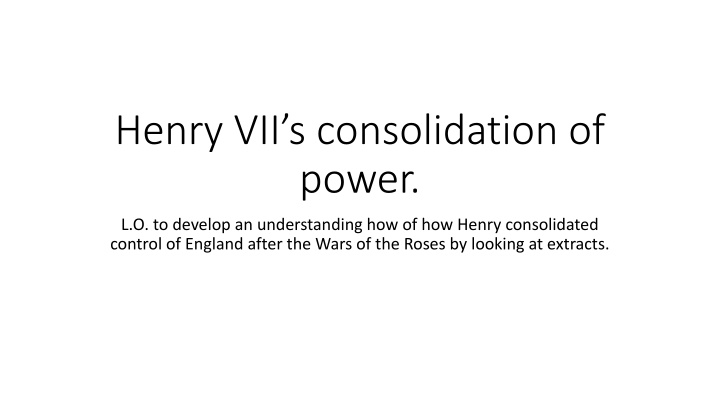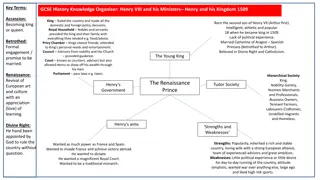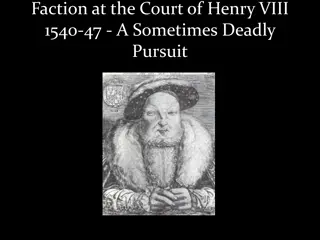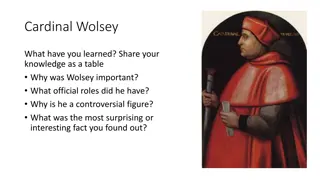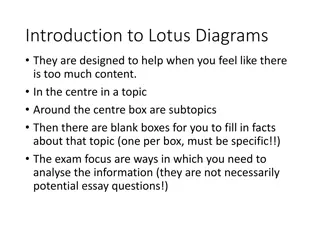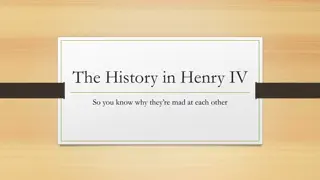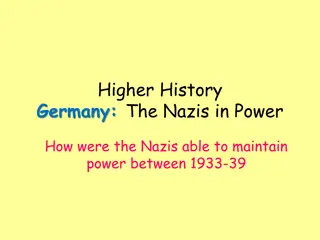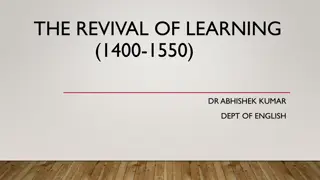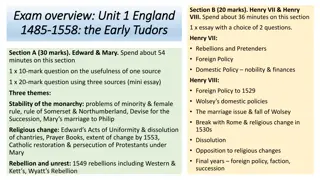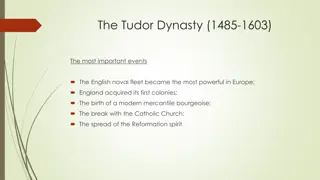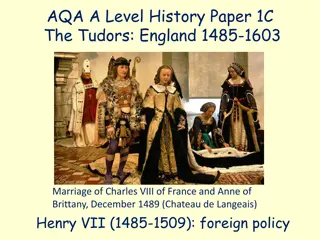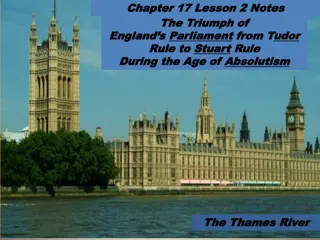Henry VII's Consolidation of Power: Strategies and Challenges
Henry VII consolidated control of England after the Wars of the Roses using tactics like proving his legitimacy, strategic marriages, religious alliances, empowering the wealthy, and eliminating rivals. Extracts highlight his approach to ruling, shrewdness, financial acumen, and the challenges he faced due to his background and lack of immediate allies.
Download Presentation

Please find below an Image/Link to download the presentation.
The content on the website is provided AS IS for your information and personal use only. It may not be sold, licensed, or shared on other websites without obtaining consent from the author.If you encounter any issues during the download, it is possible that the publisher has removed the file from their server.
You are allowed to download the files provided on this website for personal or commercial use, subject to the condition that they are used lawfully. All files are the property of their respective owners.
The content on the website is provided AS IS for your information and personal use only. It may not be sold, licensed, or shared on other websites without obtaining consent from the author.
E N D
Presentation Transcript
Henry VIIs consolidation of power. L.O. to develop an understanding how of how Henry consolidated control of England after the Wars of the Roses by looking at extracts.
Key words: Consolidate = to bring something together, to combine, to re-affirm, to secure, to make certain. Legitimacy = how much you have a right to something. E.g. Henry VII needed to prove his legitimacy as king. He needed to show that he was righteous.
Lack of popularity solve it by helping the rich to get richer. Also help the poor. Lack of legitimacy 1. Prove your legitimacy through your blood line 2. Marry someone who was related to the king. 3. Win a war against a foreign power. 4. Expand your territory 5. Use religion, get an oath of loyalty from the clergy, invoke God s name. Give the rich more power. E.g. jobs, money, authority, land. Eliminate powerful competition through assassination, exile. Imagine that you have killed the reigning monarch and need to consolidate your hold on power. Sign an agreement. 1. What challenges would you face? 2. What actions could you take to overcome these problems? Civil war- Improve people s lives. Build an army, and support.
Picture Name/s Significance Lord Stanley Lambert Simnel John de la Pole Perkin Warbeck Edward, Earl of Warwick
Picture Name/s Significance Edmund de la Pole Richard de la Pole
EXTRACT 1: Henry VII s attitude to ruling was, for the most part, similar to that of his predecessors. He believed in the imposition of strong and unquestioned royal leadership. This was particularly needed in England after an interval of instability in which the authority of the Crown had been badly damaged. However, Henry s own background also made demands on him. Henry Tudor was a stranger in England when he ascended the throne, having won that throne by conquest. Thrust in this position by the events of a single afternoon Henry had to master the realm he now ruled. Henry had no immediate relations whose services he could employ nor a reliable body of nobles he could turn to. What he did, he had to do on his own. Adapted from Wallace MacCaffrey The Oxford Illustrated History of Tudor and Stuart Britain, 2000. Summarise the extract in bullet points: Evidence to support the bullet points: Evidence to refute the bullet points:
EXTRACT 2: Henry was undoubtedly shrewd, calculating and long-headed; he seems never to have been overcome by passion. Yet if he had even a touch of the temper, this exercise of self-restraint must have cost him a great deal. Probably the hard training of a youth spent in wars, danger of execution and long exile tamed him and taught him to hide his feelings and veil his purposes. That he was eager for money is certain. He was not, however, a miser; where it served his purpose money was spent freely, and he saved and extorted only in the interests of the Crown. To the establishment o f peace, the preservation of law and order, the security of the realm he applied all his high intelligence and his determination, his shrewdness and his steady and daily interest in affairs. Adapted from Geoffrey Elton England Under the Tudors, 3rd edition, 1991 Summarise the extract in bullet points: Evidence to support the bullet points: Evidence to refute the bullet points:
EXTRACT 3: Henry s attempts to override local powers by means of his own servants, his use of spices, his institution of a personal bodyguard as soon as he became king, all point to a misguided policy, which was what he knew best. It would be surprising if local instability and Henry s deep mistrust of the nobles that bred mistrust towards the king had not raised some questions about his suitability to rule, and it is a fact that Henry was troubled by plots and rebellions for much longer than he should have been after the Battle of Stoke. Adapted from Christine Carpenter, The Wars of the Roses: Politics and the Constitution in England, c 1437 1509, 1997 Summarise the extract in bullet points: Evidence to support the bullet points: Evidence to refute the bullet points:
How effectively did the Tudors restore and develop the powers of the monarchy? Henry Tudor was effective at restoring and developing the powers of the monarchy Henry Tudor was NOT effective at restoring and developing the powers of the monarchy
Henry VII overcame all challenges to his rule with ease and lasting success. Assess the validity of this view.
